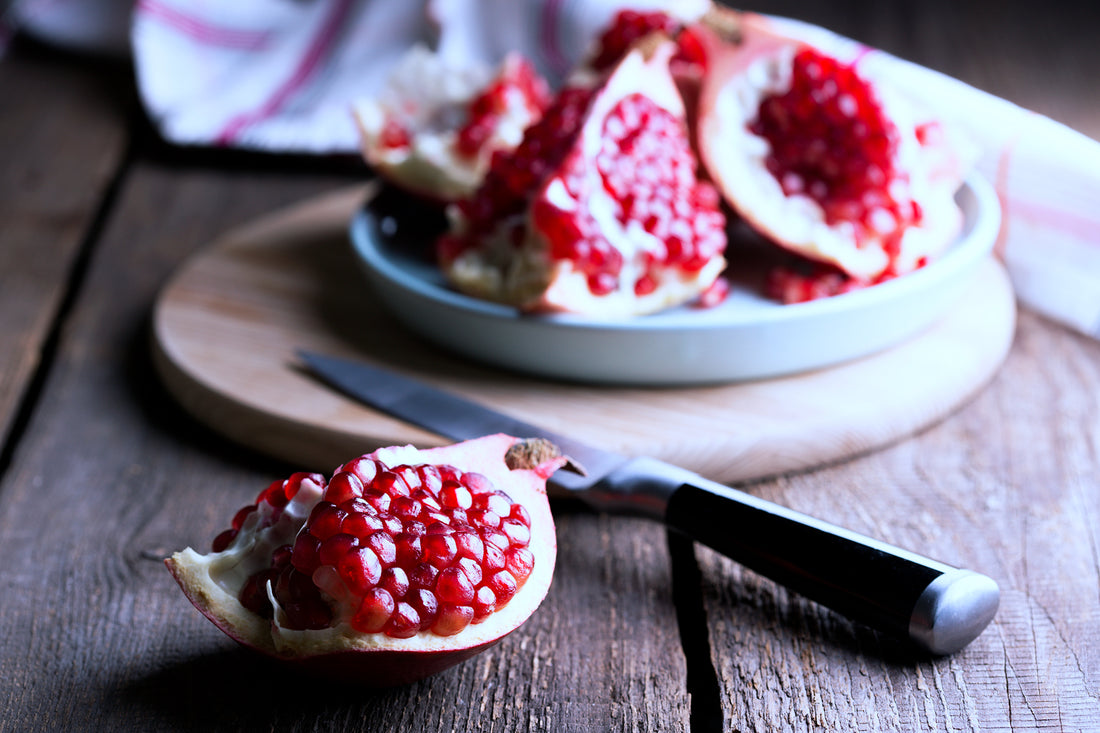
The Pomegranate
Share

The Pomegranate: A Fruit Rich in Beneficial Properties and Nutrients
The red and juicy pulp of the pomegranate is rich in vitamins, minerals, and antioxidants that help strengthen the immune system, fight inflammation, and prevent chronic diseases. It can be used as a main ingredient in cooking, as a salad dressing, as a dessert, or simply as a snack. In this guide, we will show you everything you need to know about pomegranates: how to choose them, how to store them, how to prepare them, and how to use them in cooking.
The pomegranate is one of the most well-known and appreciated fruits worldwide. Every year, over 10 million tons of pomegranates are harvested in countries like Italy, Spain, Morocco, and the United States. With its well-documented nutritional properties, this delightful berry has won the hearts of people all over the world. To access comprehensive information on the use of pomegranates in food, medicine, and cosmetics, we present 'The Pomegranate: A Complete Guide.' In this guide, you will find all the information you need to fully enjoy this extraordinary gift of nature!
The pomegranate is a shrub belonging to the Punicaceae family, native to North Africa and the Caucasus. Its ripe fruit has a round shape with a very hard ruby-colored skin and a raised crown. Inside, the seeds or arils are surrounded by a juicy white to red pulp containing numerous seeds.
The peel and bark of the pomegranate have been used since ancient times for their medicinal properties. In particular, the bark contains alkaloids with antibacterial properties, while the peel is rich in substances that can hinder the process of cell destruction (oxidation), including p53, a unique tumor protein.
Pomegranate juice, especially in pressed form, is a widely consumed beverage, rich in antioxidants and diuretic properties. Pomegranate bark infusion is known for its astringent properties.
The arils, which are the juicy pulp and seeds contained in the fruit, are edible and can be eaten alone or used as a food coloring. In some varieties, the seeds are numerous, and the pulp is very fleshy.
There are dwarf or flowering varieties that require well-drained soil and good irrigation to develop. Every part of the plant, including the bark and the membrane that surrounds the seeds, is used in various culinary and medicinal traditions.
In Italy, the pomegranate is mainly cultivated in Sicily, where it is harvested in autumn. Cities that stand out for pomegranate production include Profeta Partanna, Selinunte, and Racalmuto. The smaller-sized varieties are increasingly appreciated in the kitchen, as they are easier to handle and use in dishes, but its cultivation is also taking root in Cilento!
Despite its very hard skin, the pomegranate is easy to open: simply cut it in half and then extract the seeds with your fingers or a spoon. The seeds are ideal for enriching salads, cereals, or desserts, while the juice is perfect for preparing drinks or sauces.
We will start with a focus on the incredible nutritional benefits offered by pomegranates. This berry helps lower cholesterol levels due to its high dietary fiber content; it also provides essential nutrients such as vitamins A, B1-B6, and E. The antioxidant power of the pomegranate can be useful in combating cellular aging and has been shown to significantly reduce the risks of cardiovascular diseases.
Finally, we will discuss how to use pomegranates in the kitchen, not only as a healthy snack but also as a main ingredient in numerous tasty dishes. You can use it to make fresh salads, creamy soups, or exquisite desserts. You will also learn other creative ways to include it in your daily diet; by learning to prepare it, you can turn any boring meal into a delightful moment to share!
The Pomegranate is Beneficial and Rich in Nutritional Properties
The pomegranate is one of the oldest sources of nutrition and has been used for millennia as a powerful natural medicine. Pomegranates contain high amounts of antioxidants, vitamins, minerals, and phytonutrients that help protect the body from free radicals, boost immunity, and help prevent diseases. Pomegranates are also a rich source of fiber, essential fatty acids, carbohydrates, and proteins. They offer a wide range of health benefits, including aiding in diabetes management, reducing cholesterol, preventing heart disease, reducing the risk of cancer, and alleviating symptoms of metabolic syndrome. Its high content of vitamin C, vitamin K, magnesium, and potassium also makes it an excellent dietary supplement.
The pomegranate (Punica granatum) is a fruit rich in nutrients and health benefits. It is native to Western Asia but is also cultivated in Europe. Its juice offers numerous nutrients, including vitamins, minerals, antioxidants, and essential fatty acids, which contribute to lowering blood sugar levels and positively affect the immune system.
The flavonoids present in the fruit's peel are responsible for its intense dark red color and have potent anti-inflammatory and anti-cancer effects. They also contain significant amounts of vitamin C and bioflavonoids, useful in combating respiratory infections such as colds or rhinovirus diseases.
Pomegranate has proven effective against cardiovascular diseases thanks to the action of antioxidants that combat oxidative stress and regulate high blood pressure. In particular, the fruit extracts prevent atherosclerosis by lowering LDL cholesterol levels.
Additionally, the polyphenols naturally present in the drink improve liver function and slow down cellular aging by stimulating skin regeneration. Considered a magical elixir for a long and healthy life, it's clear that consuming it daily would bring great benefits to the human body.
Pomegranate Contraindications: When to Avoid It
Pomegranates are rich in nutrients and health benefits, but they can have some contraindications. It is advisable to avoid or limit their use in cases of food allergies or intolerances, digestive problems, or kidney disorders. It is also not recommended for patients undergoing anticoagulant treatment, as pomegranates can interfere with the effectiveness of the medication. Additionally, it can increase the risk of bleeding in patients with hemophilia, so it's best to consult your doctor before consuming pomegranates. Furthermore, it is better to avoid consuming pomegranates during pregnancy or breastfeeding.
Pomegranates are a sweet fruit that can bring numerous health benefits. However, like everything, it's important to know the possible risks associated with this food before consuming it or using its extract. Here's why you should be aware of the contraindications of pomegranates:
- If you suffer from throat inflammation or respiratory diseases, you should never consume pomegranate juice without consulting a doctor first.
- The horse chestnut contained in the pomegranate plant can cause severe allergic reactions in some individuals sensitive to it. To avoid problems, if you decide to prepare syrup with extracts yourself from a live plant, always make sure to carefully filter the pulp and the final syrup.
- Even if not prescribed in pharmacological treatment, it is still advisable to always seek medical advice before taking any pomegranate-based supplements, especially if you have pre-existing conditions such as high blood pressure or heart problems.
In conclusion, while pomegranates bring many benefits, they may also present some serious or minor issues; therefore, it's better to adhere to the warnings mentioned in this guide and consult a specialist doctor if there are any doubts related to your personal health. Let's now discover the difference between pomegranates and pomegranates.
Wonderful: The Most Well-Known Variety
The Wonderful Pomegranate is one of the most well-known varieties of this fruit, originating from California, Arizona, and Israel. It has a strong ornamental purpose for gardens and is also used in many Mediterranean cuisine recipes. Here are some main characteristics:
- Deep red color that shines in the sunlight
- Large and juicy pomegranate seeds
- A sweet and sour flavor along with the bitterness of the skin
The seeds are notable both as a seasoning and as decoration, often used on pizzas or salads. The Wonderful pomegranate can also be added to other dishes such as risotto or soup to give an extra touch of sweet and sour flavor. The soft yet crunchy pulp makes possible multiple culinary preparations without much effort. You can easily extract juice by taking a few whole fruits, or you can purchase ready-made jars at any supermarket. The nutritional benefits are very high thanks to the vitamins A, C, and E contained in the skin and the tender white pulp.
Thanks to all the advantages offered by the Wonderful variety, it is no surprise that many people decide to include this extraordinary type of pomegranate in their garden or on their balcony! To enjoy its nutritional benefits takes very little time: just a few simple steps are enough to deseed the pomegranate easily and quickly...
How to Deseed Easily and Quickly
About 50% of the world's population consumes pomegranate as a daily snack, making this fruit one of the most loved in the world. But before discovering how to deseed the pomegranate easily and quickly, it is important to understand what a pomegranate is and its beneficial properties. The Pomegranate (Punica granatum) belongs to the Punicaceae family and is native to Western Asia, but can also be found in Mediterranean regions today. The seeds contained within the fruit have numerous antioxidant properties useful for combating free radical formation, while the petals are known for their richness in minerals such as iron, potassium, and magnesium. Additionally, there is a dwarf species called Natalina that is much smaller in size compared to the classic one.
To deseed the pomegranate easily, just follow a few simple steps: first, cut it in half along the circumference, then take a spoon from the lower part and gently extract all the seeds from the central shell, stopping only if necessary to break any remaining white links between
